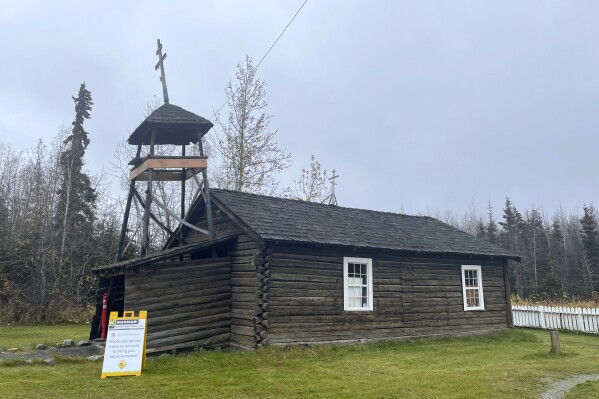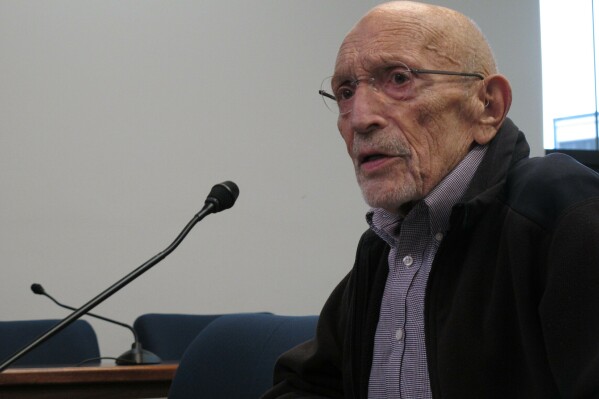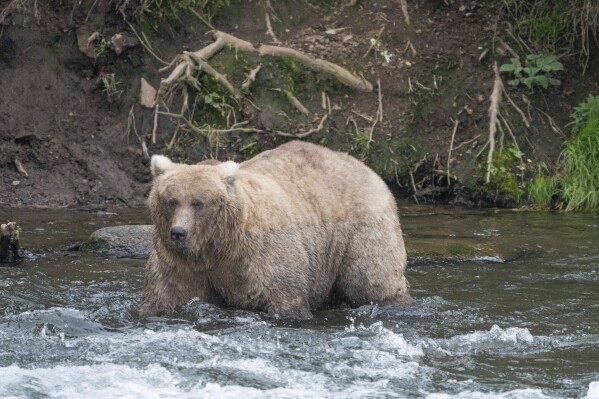Marvin Roberts flashes four fingers in a sign of solidarity for the so-called Fairbanks Four following his address at the Alaska Federation of Natives conference in Anchorage, Alaska, on Oct. 17, 2015. Roberts and three other men were convicted of killing a Fairbanks, Alaska teenager in 1997, but prosecutors vacated the convictions in 2015 after a key witness recanted testimony and a weeks-long federal review that included new evidence and testimony. The city of Fairbanks said Monday, Nov. 6, 2023, that it had settled with three of the four men for nearly $5 million. Roberts declined a settlement offer and his case is still pending.
- Marvin Roberts, one of the so-called Fairbanks Four, wipes his eye while addressing the Alaska Federation of Natives conference in Anchorage, Alaska, Saturday, Oct. 17, 2015. Roberts and three other men were convicted of killing a Fairbanks, Alaska teenager in 1997, but prosecutors vacated the convictions in 2015 after a key witness recanted testimony and a weeks-long federal review that included new evidence and testimony. The city of Fairbanks said Monday, Nov. 6, 2023, that it had settled with three of the four men for nearly $5 million. Roberts declined a settlement offer and his case is still pending.
Marvin Roberts, right, hugs his lawyer, Alaska Innocence Project attorney Bill Oberly, during Roberts’ address at the Alaska Federation of Natives conference in Anchorage, Alaska, on Oct. 17, 2015. Roberts and three other men were convicted of killing a Fairbanks, Alaska teenager in 1997, but prosecutors vacated the convictions in 2015 after a key witness recanted testimony and a weeks-long federal review that included new evidence and testimony. The city of Fairbanks said Monday, Nov. 6, 2023, that it had settled with three of the four men for nearly $5 million. Roberts declined a settlement offer and his case is still pending.
(AP Photo/Mark Thiessen, file)
BY BECKY BOHRER
Updated 6:22 PM MST, November 6, 2023Share
Three of the four Indigenous men who served 18 years in prison for a murder conviction in Alaska that was ultimately vacated will receive a total of nearly $5 million in a settlement confirmed by the city of Fairbanks on Monday.
The convictions of the so-called Fairbanks Four in the 1997 death of Fairbanks teenager John Hartman were vacated in 2015 after a key state witness recanted testimony and following a weeks-long hearing reexamining the case that raised the possibility others had killed Hartman.
The men — George Frese, Eugene Vent, Marvin Roberts and Kevin Pease — argued that an agreement that led to their release in which they agreed not to sue was not legally binding because they were coerced. The men also maintained there was a history of discrimination against Alaska Natives by local police. Pease is Native American; Frese, Vent and Roberts are Athabascan Alaska Natives.
The legal fight over whether the men could sue the city despite the agreement has gone on for years. In 2021, the U.S. Supreme Court declined to take up the case after a three-judge panel of the 9th U.S. Circuit Court of Appeals ruled in their favor.
OTHER NEWS

Anchorage’s oldest building, a Russian Orthodox church, gets new life in restoration project

Vic Fischer, last surviving delegate to Alaska constitutional convention, dies at age 99

Don’t mess with this mama bear: Grazer easily wins popular Fat Bear Contest at Alaska national park
Pease, Frese and Vent will each receive $1.59 million from the city’s insurer, according to a statement provided by Fairbanks city attorney Tom Chard. Roberts declined a settlement offer and his case is still pending, the statement said
BY BECKY BOHRER
Updated 6:22 PM MST, November 6, 2023Share
Three of the four Indigenous men who served 18 years in prison for a murder conviction in Alaska that was ultimately vacated will receive a total of nearly $5 million in a settlement confirmed by the city of Fairbanks on Monday.
The convictions of the so-called Fairbanks Four in the 1997 death of Fairbanks teenager John Hartman were vacated in 2015 after a key state witness recanted testimony and following a weeks-long hearing reexamining the case that raised the possibility others had killed Hartman.
The men — George Frese, Eugene Vent, Marvin Roberts and Kevin Pease — argued that an agreement that led to their release in which they agreed not to sue was not legally binding because they were coerced. The men also maintained there was a history of discrimination against Alaska Natives by local police. Pease is Native American; Frese, Vent and Roberts are Athabascan Alaska Natives.
The legal fight over whether the men could sue the city despite the agreement has gone on for years. In 2021, the U.S. Supreme Court declined to take up the case after a three-judge panel of the 9th U.S. Circuit Court of Appeals ruled in their favor.
OTHER NEWS
Anchorage’s oldest building, a Russian Orthodox church, gets new life in restoration project
Vic Fischer, last surviving delegate to Alaska constitutional convention, dies at age 99
Don’t mess with this mama bear: Grazer easily wins popular Fat Bear Contest at Alaska national park
Pease, Frese and Vent will each receive $1.59 million from the city’s insurer, according to a statement provided by Fairbanks city attorney Tom Chard. Roberts declined a settlement offer and his case is still pending, the statement said
An attorney for Roberts did not immediately reply to an email sent Monday.
The city’s statement said the decision to settle was made by its insurer, Alaska Municipal League Joint Insurance Association. The association’s executive director did not immediately return a call seeking comment.
The statement said the settlement “is not an admission of liability or fault of any kind,” and the city declined further comment about it.
A federal judge in late September signed off on a request by the parties to have the case involving Pease, Frese and Vent dismissed. The settlement agreement was reported last week by the Fairbanks Daily News-Miner.
Thomas Wickwire, an attorney for Frese and Pease, declined comment on the matter, citing Roberts’ pending case.
Terms of the settlement with each of the three men included a “non-publicity” clause in which the men and their attorneys agreed to not make public statements about the case until claims by all the men are resolved.
A state court judge in 2015 approved terms of a settlement that threw out the convictions of the four men, who had maintained their innocence in Hartman’s death. Alaska Native leaders long advocated for the men’s release, calling their convictions racially motivated.
The Alaska attorney general’s office at the time said the settlement was “not an exoneration” and called it a compromise that “reflects the Attorney General’s recognition that if the defendants were retried today it is not clear under the current state of the evidence that they would be convicted.”
___
Bohrer reported from Juneau, Alaska.
No comments:
Post a Comment